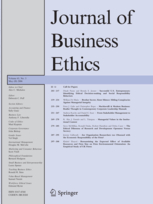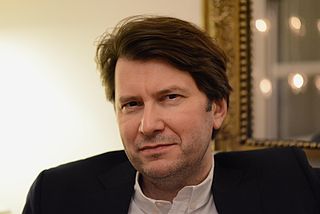Related Research Articles
Business ethics is a form of applied ethics or professional ethics, that examines ethical principles and moral or ethical problems that can arise in a business environment. It applies to all aspects of business conduct and is relevant to the conduct of individuals and entire organizations. These ethics originate from individuals, organizational statements or the legal system. These norms, values, ethical, and unethical practices are the principles that guide a business.

Ethics or moral philosophy is the philosophical study of moral phenomena. It investigates normative questions about what people ought to do or which behavior is morally right. It is usually divided into three major fields: normative ethics, applied ethics, and metaethics.
Integrity is the quality of being honest and showing a consistent and uncompromising adherence to strong moral and ethical principles and values. In ethics, integrity is regarded as the honesty and truthfulness or earnestness of one's actions. Integrity can stand in opposition to hypocrisy. It regards internal consistency as a virtue, and suggests that people who hold apparently conflicting values should account for the discrepancy or alter those values.
Bioethics is both a field of study and professional practice, interested in ethical issues related to health, including those emerging from advances in biology, medicine, and technologies. It proposes the discussion about moral discernment in society and it is often related to medical policy and practice, but also to broader questions as environment, well-being and public health. Bioethics is concerned with the ethical questions that arise in the relationships among life sciences, biotechnology, medicine, politics, law, theology and philosophy. It includes the study of values relating to primary care, other branches of medicine, ethical education in science, animal, and environmental ethics, and public health.

Corporate social responsibility (CSR) or corporate social impact is a form of international private business self-regulation which aims to contribute to societal goals of a philanthropic, activist, or charitable nature by engaging in, with, or supporting professional service volunteering through pro bono programs, community development, administering monetary grants to non-profit organizations for the public benefit, or to conduct ethically oriented business and investment practices. While once it was possible to describe CSR as an internal organizational policy or a corporate ethic strategy similar to what is now known today as Environmental, Social, Governance (ESG); that time has passed as various companies have pledged to go beyond that or have been mandated or incentivized by governments to have a better impact on the surrounding community. In addition national and international standards, laws, and business models have been developed to facilitate and incentivize this phenomenon. Various organizations have used their authority to push it beyond individual or even industry-wide initiatives. In contrast, it has been considered a form of corporate self-regulation for some time, over the last decade or so it has moved considerably from voluntary decisions at the level of individual organizations to mandatory schemes at regional, national, and international levels. Moreover, scholars and firms are using the term "creating shared value", an extension of corporate social responsibility, to explain ways of doing business in a socially responsible way while making profits.

Social responsibility is an ethical framework in which a person works and cooperates with other people and organizations for the benefit of the community.
Ole Thyssen is a Danish philosopher and sociologist, and Professor at the Copenhagen Business School.
Organizational ethics is the ethics of an organization, and it is how an organization responds to an internal or external stimulus. Organizational ethics is interdependent with the organizational culture. Although it is to both organizational behavior and industrial and organizational psychology as well as business ethics on the micro and macro levels, organizational ethics is neither organizational behavior nor industrial and organizational psychology, nor is it solely business ethics. Organizational ethics express the values of an organization to its employees and/or other entities irrespective of governmental and/or regulatory laws.
Workplace spirituality or spirituality in the workplace is a movement that began in the early 1920s. It emerged as a grassroots movement with individuals seeking to live their faith and/or spiritual values in the workplace. Spiritual or spirit-centered leadership is a topic of inquiry frequently associated with the workplace spirituality movement.
Simon Zadek is a writer and advisor focused on business and sustainability. He is the Co-Director of the UNEP Inquiry into the Design of a Sustainable Financial System.
Ethical leadership is leadership that is directed by respect for ethical beliefs and values and for the dignity and rights of others. It is thus related to concepts such as trust, honesty, consideration, charisma, and fairness.

The Journal of Business Ethics is a peer-reviewed academic journal published by Springer. The Journal of Business Ethics is one of the journals used by the Financial Times for in compiling the Business Schools research rank.
A corporate social entrepreneur (CSE) is someone who attempts to advance a social agenda in addition to a formal job role as part of a corporation. It is possible for CSEs to work in organizational contexts that are favourable to corporate social responsibility (CSR). CSEs focus on developing both social capital and economic capital, and their formal job role may not always align with corporate social responsibility. A person in a non-executive or managerial position can still be considered a CSE.

Ole Fogh Kirkeby is a Danish philosopher and a professor at Copenhagen Business School in the Philosophy of Leadership.
Moral blindness, also known as ethical blindness, is defined as a person's temporary inability to see the ethical aspect of a decision they are making. It is often caused by external factors due to which an individual is unable to see the immoral aspect of their behavior in that particular situation.

Ghislain Deslandes is a philosopher born in Angers (France) on the 16th of August 1970.
Indian Ethos in Management refers to the values and practices that the culture of India can contribute to service, leadership and management. These values and practices are rooted in Sanathana Dharma, and have been influenced by various strands of Indian philosophy.
Lynn S. Paine is currently a Baker Foundation Professor and John G. McLean Professor of Business Administration, Emerita, at Harvard Business School. Her research interests are company ethical and financial leadership and corporate governance, focusing on how companies can maintain high ethical standards while achieving outstanding financial results. Her latest book is Capitalism at Risk, Updated and Expanded: How Business Can Lead, with HBS colleagues Joe Bower and Dutch Leonard. Her text and casebook Cases in Leadership, Ethics, and Organizational Integrity: A Strategic Perspective came out in 1996. Library Journal named her book Value Shift: Why Companies Must Merge Social and Financial Imperatives to Achieve Superior Performance one of that year’s best business books. Her recent publications also include "Covid-19 Is Rewriting the Rules of Corporate Governance," "A Guide to the Big Ideas and Debates in Corporate Governance," "CEOs Say Their Aim Is Inclusive Prosperity. Do They Mean It?," “The Error at the Heart of Corporate Leadership,” and “Sustainability in the Boardroom" — all published in the Harvard Business Review. She has written more than 200 cases taught at HBS and other business schools.

Jean Garner Stead is an American management academic, author and consultant. She is professor emerita of Management at East Tennessee State University.
Peter Bogetoft is a Danish author, economist and professor in the Department of Economics at Copenhagen Business School. He is recognized for his significant contributions to applied microeconomics and managerial economics.
References
- 1 2 3 4 Peter Pruzan, 70 - the Global Dharma Center!, 2006. Accessed 11 October 2013.
- ↑ Rose, Caspar, and Steen Thomsen. "The Impact of Corporate Reputation on Performance:: Some Danish Evidence." European Management Journal 22.2 (2004): 201-210.
- ↑ Morsing, Mette, and Majken Schultz. "Corporate social responsibility communication: stakeholder information, response and involvement strategies." Business Ethics: A European Review 15.4 (2006): 323-338.
- 1 2 "CBS - Copenhagen Business School".